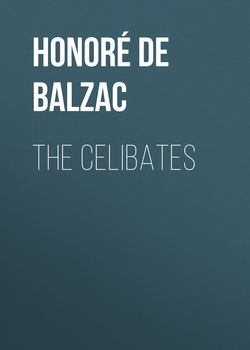The Celibates

Реклама. ООО «ЛитРес», ИНН: 7719571260.
Оглавление
Honoré de Balzac. The Celibates
INTRODUCTION
PIERRETTE
DEDICATION
I. THE LORRAINS
II. THE ROGRONS
III. PATHOLOGY OF RETIRED MERCERS
IV. PIERRETTE
V. HISTORY OF POOR COUSINS IN THE HOME OF RICH ONES
VI. AN OLD MAID'S JEALOUSY
VII. DOMESTIC TYRANNY
VIII. THE LOVES OF JACQUES AND PIERRETTE
IX. THE FAMILY COUNCIL
X. VERDICTS – LEGAL AND OTHER
ADDENDUM
THE VICAR OF TOURS
DEDICATION
I
II
III
IV
ADDENDUM
THE TWO BROTHERS
DEDICATION
CHAPTER I
CHAPTER II
CHAPTER III
CHAPTER IV
CHAPTER V
CHAPTER VI
CHAPTER VII
CHAPTER VIII
CHAPTER IX
CHAPTER X
CHAPTER XI
CHAPTER XII
CHAPTER XIII
CHAPTER XIV
CHAPTER XV
CHAPTER XVI
CHAPTER XVII
ADDENDUM
Отрывок из книги
At the dawn of an October day in 1827 a young fellow about sixteen years of age, whose clothing proclaimed what modern phraseology so insolently calls a proletary, was standing in a small square of Lower Provins. At that early hour he could examine without being observed the various houses surrounding the open space, which was oblong in form. The mills along the river were already working; the whirr of their wheels, repeated by the echoes of the Upper Town in the keen air and sparkling clearness of the early morning, only intensified the general silence so that the wheels of a diligence could be heard a league away along the highroad. The two longest sides of the square, separated by an avenue of lindens, were built in the simple style which expresses so well the peaceful and matter-of-fact life of the bourgeoisie. No signs of commerce were to be seen; on the other hand, the luxurious porte-cocheres of the rich were few, and those few turned seldom on their hinges, excepting that of Monsieur Martener, a physician, whose profession obliged him to keep a cabriolet, and to use it. A few of the house-fronts were covered by grape vines, others by roses climbing to the second-story windows, through which they wafted the fragrance of their scattered bunches. One end of the square enters the main street of the Lower Town, the gardens of which reach to the bank of one of the two rivers which water the valley of Provins. The other end of the square enters a street which runs parallel to the main street.
At the latter, which was also the quietest end of the square, the young workman recognized the house of which he was in search, which showed a front of white stone grooved in lines to represent courses, windows with closed gray blinds, and slender iron balconies decorated with rosettes painted yellow. Above the ground floor and the first floor were three dormer windows projecting from a slate roof; on the peak of the central one was a new weather-vane. This modern innovation represented a hunter in the attitude of shooting a hare. The front door was reached by three stone steps. On one side of this door a leaden pipe discharged the sink-water into a small street-gutter, showing the whereabouts of the kitchen. On the other side were two windows, carefully closed by gray shutters in which were heart-shaped openings cut to admit the light; these windows seemed to be those of the dining-room. In the elevation gained by the three steps were vent-holes to the cellar, closed by painted iron shutters fantastically cut in open-work. Everything was new. In this repaired and restored house, the fresh-colored look of which contrasted with the time-worn exteriors of all the other houses, an observer would instantly perceive the paltry taste and perfect self-satisfaction of the retired petty shopkeeper.
.....
Before the year was out political intrigues were not less lively than the matrimonial schemes of the Rogron salon. While the selfish interests hidden in these hearts were struggling in deadly combat the events which resulted from them had a fatal celebrity. Everybody knows that the Villele ministry was overthrown by the elections of 1826. Vinet, the Liberal candidate at Provins, who had borrowed money of his notary to buy a domain which made him eligible for election, came very near defeating Monsieur Tiphaine, who saved his election by only two votes. The headquarters of the Liberals was the Rogron salon; among the habitues were the notary Cournant and his wife, and Doctor Neraud, whose youth was said to have been stormy, but who now took a serious view of life; he gave himself up to study and was, according to all Liberals, a far more capable man than Monsieur Martener, the aristocratic physician. As for the Rogrons, they no more understood their present triumph than they had formerly understood their ostracism.
The beautiful Bathilde, to whom Vinet had explained Pierrette as an enemy, was extremely disdainful to the girl. It seemed as though everybody's selfish schemes demanded the humiliation of that poor victim. Madame Vinet could do nothing for her, ground as she herself was beneath those implacable self-interests which the lawyer's wife had come at last to see and comprehend. Her husband's imperious will had alone taken her to the Rogron's house, where she had suffered much at the harsh treatment of the pretty little creature, who would often press up against her as if divining her secret thoughts, sometimes asking the poor lady to show her a stitch in knitting or to teach her a bit of embroidery. The child proved in return that if she were treated gently she would understand what was taught her, and succeed in what she tried to do quite marvellously. But Madame Vinet was soon no longer necessary to her husband's plans, and after the arrival of Madame and Mademoiselle de Chargeboeuf she ceased to visit the Rogrons.
.....